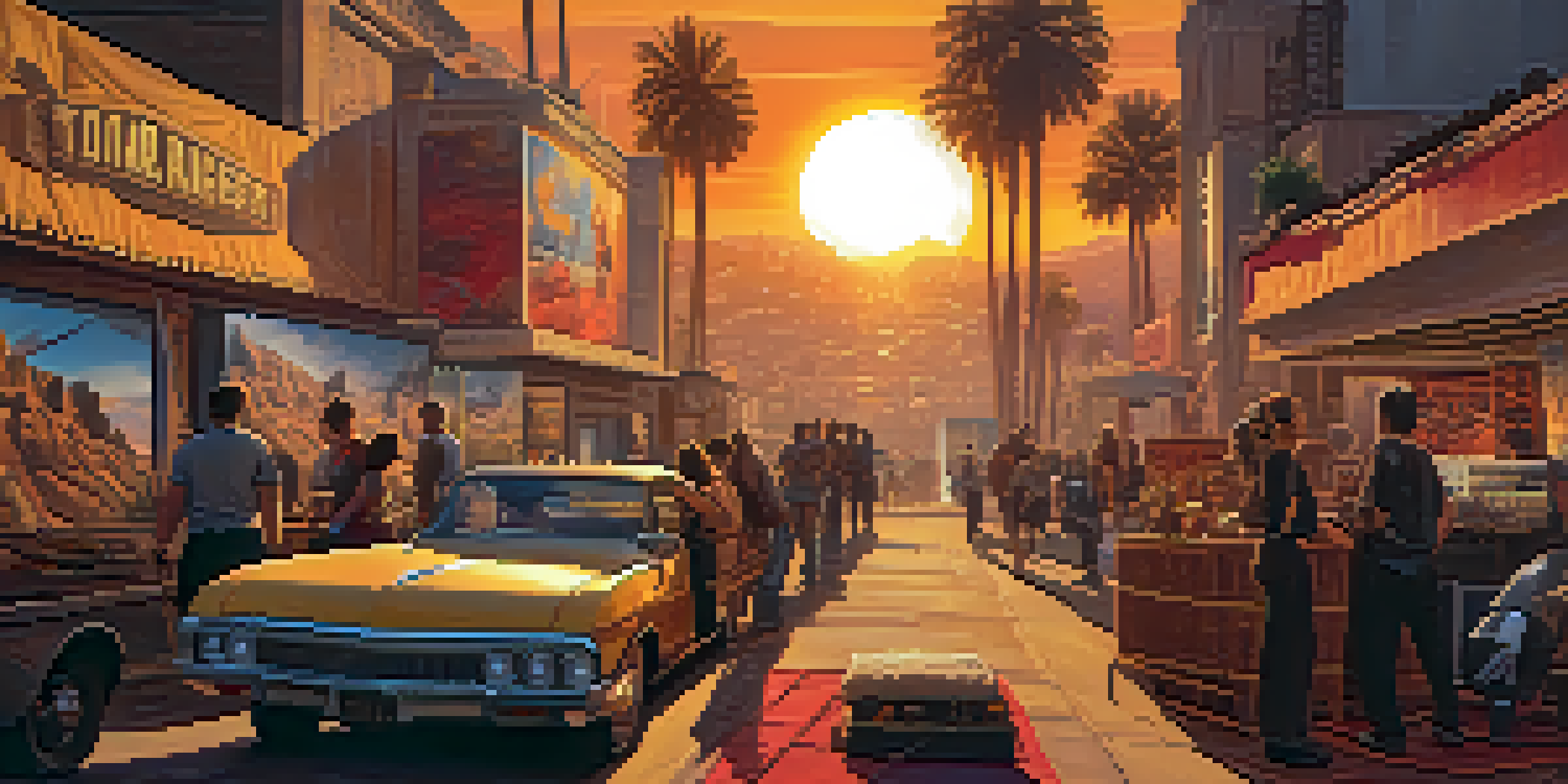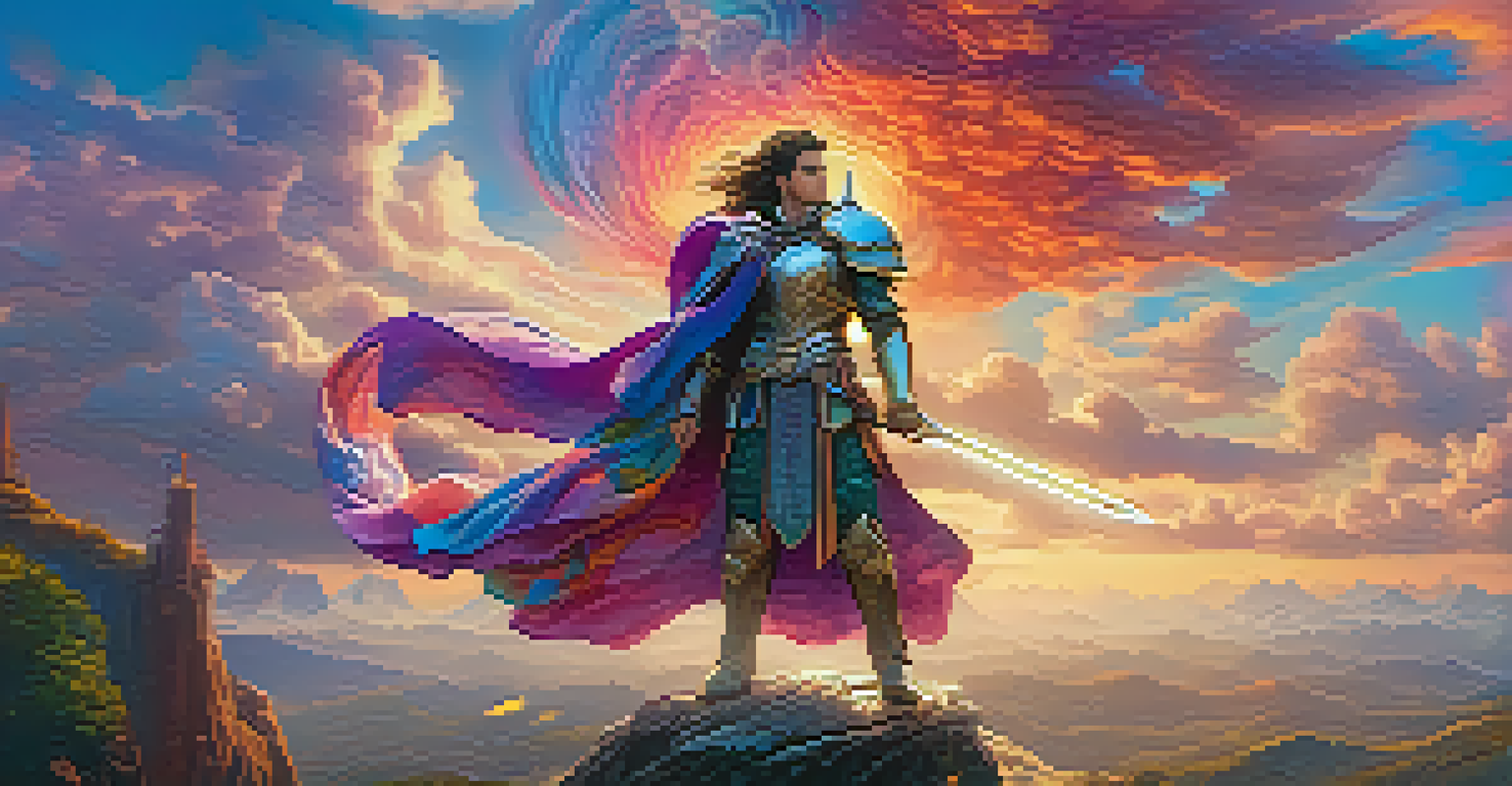Hollywood's Adaptation of Video Games: A New Frontier in Film

The Rise of Video Game Adaptations in Hollywood
In recent years, Hollywood has increasingly turned to video games for inspiration. This shift reflects a broader trend of adapting popular media into films, tapping into established fan bases. With the growing popularity of gaming, studios recognize the potential for box office success by transforming beloved games into cinematic experiences.
Video games are a new frontier for storytelling, and Hollywood is just starting to explore that potential.
Video game adaptations are no longer seen as niche projects; they've become a significant part of mainstream cinema. For instance, films like 'Detective Pikachu' and 'Sonic the Hedgehog' have demonstrated that there's a substantial audience willing to embrace these adaptations. This newfound interest has also ushered in a wave of creativity, leading filmmakers to explore innovative storytelling techniques.
As technology advances, the cinematic representation of video games has improved dramatically. High-quality visuals and compelling narratives have made these adaptations more appealing to both gamers and non-gamers alike. This evolution not only enhances the viewing experience but also bridges the gap between gaming and filmmaking.
Challenges in Adapting Video Games for the Big Screen
While the potential is significant, adapting video games into films comes with its own set of challenges. One of the primary hurdles is maintaining the essence of the original game while crafting a narrative that works for a two-hour film. Filmmakers often grapple with balancing character development, plot pacing, and fan expectations.

Moreover, many early adaptations fell flat, leading to a reputation for poor quality. Films like 'Super Mario Bros.' and 'Alone in the Dark' serve as cautionary tales, demonstrating the pitfalls of straying too far from the source material. These experiences have taught studios the importance of staying true to the game's core elements.
Growing Popularity of Adaptations
Hollywood's increasing interest in video game adaptations reflects a broader trend of tapping into established fan bases for box office success.
Another challenge lies in the interactive nature of video games. Unlike films, games allow players to make choices and influence outcomes, which can be difficult to translate to a linear format. Adapting these dynamic experiences into a coherent film narrative requires creative ingenuity and a deep understanding of the source material.
Successful Examples of Video Game Adaptations
Despite the challenges, several video game adaptations have achieved significant success at the box office and with critics alike. Notably, films like 'Tomb Raider' and 'The Witcher' series have captivated audiences by staying true to their roots while introducing fresh elements. These successes demonstrate that when done right, adaptations can resonate deeply with fans.
The success of video game adaptations depends on how well they respect the source material while still offering something fresh and engaging.
Another standout is 'The Last of Us' series on HBO, which has garnered acclaim for its faithful representation of the game's narrative and emotional depth. This adaptation has set a new standard for how video game stories can be told on screen, highlighting the importance of strong character arcs and relationships.
These successes not only validate the potential of video game adaptations but also inspire studios to invest in more projects. With positive reception, audiences are more willing to explore new adaptations, creating a feedback loop that encourages quality storytelling in the genre.
The Role of Fans in Shaping Adaptations
Fans play a crucial role in shaping the direction of video game adaptations. Their passion and dedication to the source material often influence the creative decisions made by filmmakers. By actively engaging with their favorite franchises, fans express their desires and expectations, which can lead to more authentic representations on screen.
Social media has become a powerful platform for fans to voice their opinions and connect with creators. This direct line of communication allows studios to gauge what resonates with audiences, leading to adaptations that are more aligned with fan expectations. The influence of fan feedback can be seen in recent adaptations that prioritize faithful storytelling.
Challenges of Film Adaptations
Adapting video games into films presents challenges such as maintaining the essence of the original game while crafting a compelling narrative.
Moreover, fan communities often rally around adaptations, generating buzz and excitement. This engagement not only boosts ticket sales but also fosters a sense of belonging among fans. When adaptations respect the source material, they cultivate a loyal following that can drive future projects.
Innovative Storytelling Techniques in Adaptations
As filmmakers become more adept at adapting video games, innovative storytelling techniques are emerging. Many adaptations now focus on character-driven narratives that emphasize emotional depth, rather than merely replicating gameplay. This shift allows filmmakers to explore the rich backstories and motivations of beloved characters, creating a more immersive experience for viewers.
Additionally, some adaptations have embraced non-linear storytelling, a concept familiar to gamers. By incorporating flashbacks or multiple perspectives, filmmakers can create a dynamic narrative that mirrors the complexity of video game plots. This approach not only engages the audience but also reflects the source material's interactive nature.
Furthermore, the blending of genres is becoming more prevalent. For instance, 'Resident Evil' combines horror with action, offering a unique viewing experience. By experimenting with different genres, filmmakers can attract diverse audiences while staying true to the game's essence.
The Future of Video Game Adaptations in Hollywood
Looking ahead, the future of video game adaptations in Hollywood appears promising. With a growing acceptance of these projects, studios are increasingly willing to invest in high-quality adaptations. This trend is likely to continue as the gaming industry expands and new franchises gain popularity.
Moreover, the rise of streaming platforms has opened up new avenues for storytelling. Series adaptations, like 'The Witcher' and 'Halo,' provide opportunities for deeper character exploration and longer narratives. This format allows creators to delve into complex storylines that may not fit into a feature film's runtime.
Role of Fans in Adaptations
Fans play a crucial role in shaping video game adaptations by influencing creative decisions and fostering excitement through their engagement.
As technology advances, filmmakers will also have more tools at their disposal to create captivating visual experiences. With the integration of augmented reality and virtual reality, the line between gaming and film may blur even further, offering audiences immersive experiences like never before.
Key Takeaways from Hollywood's Approach to Video Game Adaptations
In conclusion, Hollywood's approach to adapting video games is evolving, marked by both successes and challenges. The industry's growing recognition of the potential in these adaptations has led to more thoughtful storytelling and creative innovation. By learning from past missteps and embracing fan feedback, filmmakers can create adaptations that resonate with audiences.
Successful adaptations highlight the importance of staying true to the source material while exploring new creative directions. This balance is crucial in capturing the hearts of gamers and introducing new audiences to these beloved franchises. As the landscape of filmmaking continues to change, the demand for quality adaptations will only grow.

Ultimately, video game adaptations represent a new frontier in film, offering exciting possibilities for storytelling. With a bright future ahead, both filmmakers and fans can look forward to a thriving relationship that celebrates the intersection of gaming and cinema.